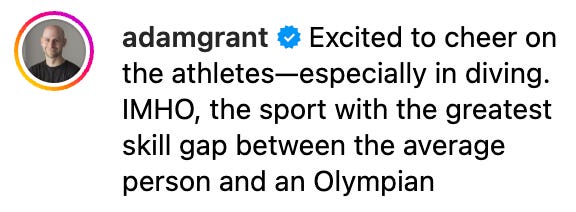The writing strategy of a superstar scholar
Three tactics you could borrow from writing productivity powerhouse, Adam Grant
Hello writing friends Chris here,
If you’ve ever belly flopped into a pool on holiday after attempting a graceful dive, you might relate to Adam Grant’s post from a few days ago.
It got me thinking about how we get good at things in different fields and that in many ways, the struggle is the same. Himself a former junior Olympic springboard diver, Grant has gone to be one of the most prolific and successful academics in his field1 – and someone we can all learn from.
So, this week I thought I’d share three things I wrote a while ago about Grant’s writing strategy. Having read and listened to lots of interviews with him over the years, I’ve come to think he relies on some specific tactics that perhaps in combination, make him the productivity powerhouse that he is.
Of course, I’m not suggesting you copy his approach but rather that you consider whether you could borrow and of his tactics and apply them to your life.
1. He batches his time
Grant’s epic level of productivity depends on many factors but interviewing him for his book Deep Work, fellow academic Cal Newport believes he’s found at least one that really seems to matter – he time-blocks or ‘batches’ his time. He writes:
“Within the year, [Grant] stacks his teaching into the Fall semester, during which he can turn all of his attention to teaching well and being available to his students. By batching his teaching in the Fall, Grant can turn his attention fully to research in the spring and summer.”
Newport also writes about how Grant uses this batching or time blocking approach on a smaller time scale too.
“[Grant] alternates between periods where his door is open to students and colleagues, and periods where he isolates himself to focus completely and without distraction on a single research task.”
Newport explains how Grant divides up the writing of a scholarly paper into three tasks – analysing the data, writing a draft from start to finish and editing.
Each of these phases takes around three to four days and to keep undisturbed, Grant switches on his out-of-office auto responder – even though he’s in the office. Something that often confuses colleagues but helps him focus and get the necessary work done.
2. He leaves work unfinished
Being interviewed for Forbes, Grant explains that he purposely uses a method drawn from psychology to keep him super-productive – he deliberately leaves things half finished.
Talking to contributor Dorie Clarke, Grant says: “I start a lot of things and purposely leave them unfinished. When I have a bunch of really long emails and I need time to think about the response, I’ll actually start replying, leave them as drafts, and move onto something else mid-sentence.”
Grant explains that he takes this approach because he knows that when you leave something unfinished you often unconsciously keep mulling it over.
This technique is called the Zeigarnik Effect, a proven psychological state which means that people remember uncompleted or interrupted tasks better than completed ones because our attention is drawn to them.
He says: “If I finish a paragraph [when I’m writing], it takes a while to get back to where I left it three days earlier. But if I left a sentence unfinished, more often than not, I can literally dive right back into where I was.”
3. He focuses on three things
But being one of his field’s most successful and high-profile scholars – he has celeb status in many academic circles – must only add to the huge volume of distractions that he must face on a daily basis.
Talking to GQ, Grant says that one method he uses to keep focused and distraction at bay and that’s to begin each week with just three things that he wants to get done in that week. He says:
“I try to start every week with three things that I want to accomplish that I care about. And then three ways that I want to help other people. And that’s the compass for the week. I’ll plan my whole schedule around those things. Sometimes I find that I overshot dramatically. I could only accomplish one thing and be helpful in one way. But I try to have the three and three front and center, so I evaluate everything else that comes in through the lens of, “Is this going to stand in the way of the major things that I’m trying to get done this week, and the major ways that I want to show up for others this week?””
Grant also explains why he believes that the focus of your productivity shouldn’t be ‘to be more productive’ but rather on the project you have to finish and your motivations and ambitions for the research. What will you gain if you achieve your ambitions? What are you going to lose if you don’t? Talking to GQ he explains:
“I think the worst way to be more productive is to set your sights on being more productive. What you want to do instead is to focus on a reason to be more productive. I try to reconnect with the motivation for doing it, what’s fascinating about it, what’s meaningful about it. And then the productivity kind of naturally kicks in.”
What’s your strategy?
Whilst Grant’s uber-productivity can make you wonder what on earth you’ve done with your life, his approach to his writing is also reassuring as he’s clearly developed a strategy and system over the years to help him produce at the level he does – and it’s this strategy that any kind of writer can learn from.
What Grant has in common with successful – and least stressed out – writers is that he’s created a personal system that helped him become a prolific academic. He doesn’t rely on willpower to help him write, he’s develop a process that works for him. That process probably won’t be for you but you can find one for yourself by experimenting with your writing routine and monitoring how you write.
See you soon
Chris
Grant is a world-leading authority on organisational psychology and one of life’s super achievers. At the tender age of 28, he was the youngest ever tenured professor at Wharton. He’s the author of hundreds of research papers and five best-selling books (one of them co-authored with his mate, Sheryl Sandberg, the ex COO of Facebook). In his spare time, he hosts a podcast, presents Ted Talks and advises the World Economic Forum. He even finds time to write books for kids. He does all this while having a family and a packed teaching schedule.









I love that his post on instagram talks about the skill gap. When we look at someone like Grant and his expertise across a whole bunch of areas, we often just focus on THE GAP, but actually, his methods are all small incremental things he does himself. We can do those things. We might not get the results, but doing them is under our control.
What's fascinating about writing my novel? What's meaningful about it?
Talk about energy!
Plus, there's no judgment when I only get so far. As long as I'm connected to why I'm writing, if something takes me longer, even much longer, than I thought it would, I'm not "behind" and I can't fault myself for "not finishing" a chapter. Discovery trumps productivity.
Thank you for this!!!!